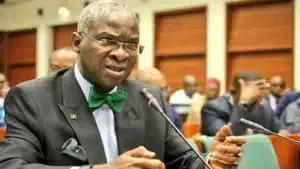
Former Lagos State Governor and immediate-past Minister of Works and Housing, Babatunde Fashola, has urged Nigeria’s sports stakeholders to embrace a long-term, structured approach to revamp the nation’s sporting landscape.
Speaking on Sunday at the University of Lagos’ Tayo Aderinokun Hall during the launch of veteran sports journalist Mumini Alao’s autobiography, Fashola delivered a keynote address titled “Re-thinking the current football business model in Nigeria as a catalyst for sports development.”
Referencing Nigeria’s rich sports history, he pointed out that the country already has a foundation for success through structures like the National Sports Commission.
According to him, the real challenge lies in commitment, discipline, and strategic execution.
“As has been the case with many challenges we have confronted, the solutions are within reach if we are prepared to do the hard work, enforce the rules and delay gratification,” Fashola said.
“We must not look for quick fixes. I subscribe to the idea of a 10-year plan and a decade of commitment to sports development.”
Fashola stressed that the first step should be building a sustainable framework that can attract funding, rather than focusing solely on financial concerns.
“I hear the unspoken question about where the money will come from. My answer is that we must develop a plan and programme that is capable of being funded before we start losing sleep about funds. Almost too often, we agonise about funding without developing a workable plan,” he explained.
Drawing from his time as Lagos State governor, Fashola shared how a well-coordinated calendar of sporting activities, running from March to December, helped unearth new talent and reawaken corporate interest.
He recalled: “We had all school sports from March to June, and from July to December we had table tennis, squash, swimming, scrabble, the Governor’s Lawn Tennis Cup, and the climax was on December 26 at the boxing finals at Rowe Park, which I attended diligently.
“Not only did they produce many talents for state and country, they revived the interest of old sponsors like Chief Rasak Okoya and his Asoju Oba Cup, FCMB, Etisalat, Julius Berger, and many other brands became willing and enthusiastic partners and sponsors.”
Beyond his political career, Fashola has long been recognised for his contributions to sports development.
In a testament to his influence, the International Table Tennis Federation Africa recently named the maiden edition of the ITTF Africa Youth Cup after him.
The post Fashola Calls For Long-Term Commitment To Transform Nigerian Sports appeared first on Naija News.

